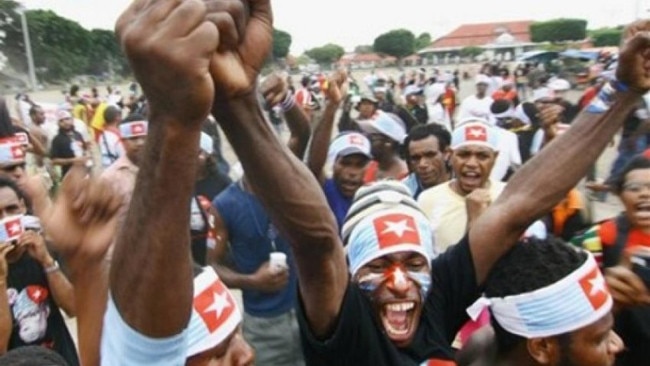Families of victims deny claim in Papua massacre
The arrest on Monday of six soldiers for the crime, has cast an uncomfortable spotlight on Indonesia’s running sore.

The murder of four Papuan civilians last month, and the arrest on Monday of six soldiers for the crime, has cast an uncomfortable spotlight on Indonesia’s running sore: a highly militarised region with a long history of insurgency that together have fuelled a cycle of violence and retribution.
Papuan authorities say the victims, whose headless and dismembered bodies were found stuffed in sacks in West Papua’s Timika district – home of the world’s largest gold mine – were separatist insurgents trying to buy weapons from special forces soldiers who allegedly robbed them of 250m rupiah ($25,000) and murdered them.
But a vastly different account has since emerged from the families of the four men, and their local government regent, who insist they were civilians on their way to buy building supplies and agricultural equipment for their village.
Among the victims were Nduga village chief Irian Nirigi and Arnold Lokbere, a co-signatory to the village bank account, who left for Timika on Monday, August 22. Along for the ride were two other men, Atis Tini, 23, and Lemaniol Nirigi, 29.
A statement by the victims’ families on Thursday rejects police claims that at least one of the men was a sympathiser of the West Papua National Liberation Army (TPNBP), a separatist group responsible for the massacre of at least 19 construction workers in Nduga in late 2018.
“We, the families of the victims, know they are civilians and that they were in Timika to shop for building materials, which were to be shipped to Nduga via sea routes,” they said.
“The Regent of Nduga has stated firmly that the four victims are really his citizens and are civilians. The TNI (Indonesian military) kills civilians in Papua like hunting animals.”
Regent Namia Gwijangge called for authorities to conduct a full and transparent investigation into the “sadistic” murders and for the perpetrators to face the death penalty for their crimes. He also pleaded with local Papuans not to retaliate.
“This is a purely criminal case. I urge the Nduga tribal people not to make provocations, or take actions that can harm us all,” he said, articulating wider fears of reprisal attacks in one of the region’s most militarised areas.
Indonesian military chief Andika Perkasa said the six soldiers have been charged with premeditated murder, for which they could face the death penalty or, at minimum, 20 years’ jail.
Police spokesman Ahmad Musthofa Kamal said the suspects had admitted their motive was robbery after the victims approached them to buy arms, and that they had divided the money between them. But police were also investigating the families’ claim that the men were buying building supplies, as well as the source of the money “which must be clearly designated”, he said.
President Joko Widodo, six weeks out from his centrepiece G20 leaders’ summit in Bali, ordered the military this week to assist in the probe, and warned its reputation as the nation’s defender was on the line.
That order has raised questions over the TNI’s ability to investigate its own. Rights groups have long complained of a culture of impunity in Papua, where past killings of civilians by soldiers or police have gone either unpunished, or tried in military courts that have handed down far lighter punishments.
That alleged culture of impunity, they say, is aided by the government’s long-standing policy of restricting access to Papua for international human rights workers, foreign journalists and the UN’s Office of the Commissioner for Human Rights.
Jokowi has tried to address the region’s problems – poverty, corruption and violence – by ending the transmigration of non-Papuan Indonesians to the region, and through infrastructure projects such as the Trans Papuan roads network. But many separatist groups and locals oppose those projects for fear they will destroy indigenous livelihoods, and lead to more outside plundering of their resources.
Clashes between the military and insurgent groups have risen sharply since the 2018 Nduga massacre of road workers.
At least four Papuans were killed in reprisal military operations following that deadly attack. Dozens more have since died as a result of squalid conditions in refugee camps where thousands of civilians have since fled, including the family of the slain village chief.



To join the conversation, please log in. Don't have an account? Register
Join the conversation, you are commenting as Logout